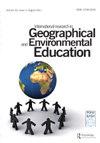Latin American geography education research trends in open access journals from the twenty-first century
IF 3.1
Q2 EDUCATION & EDUCATIONAL RESEARCH
International Research in Geographical and Environmental Education
Pub Date : 2021-08-04
DOI:10.1080/10382046.2021.1961061
引用次数: 2
Abstract
Abstract Recent projects, declarations, and articles around the globe addressed the status and development of geography education, where the discipline is standing, and what should be done to enhance the quality and quantity of research. Nevertheless, the paucity of research and limited approaches in Latin America about the type of studies published has made difficult the promotion and development of research lines, or even more an international comparative perspective. Therefore, the aim of the study is to show the spatiotemporal trends and existing research lines in geography education, extracted from 1880 articles published in 140 open access journals within the region from 2000 to 2019. The findings showed a consistent growth of research especially after 2010, just a few journals gathering most publications, and the intraregional disparity among countries on the evolution of the number and type of studies. Although Latin American researchers increased the number of publications in all research lines, the scientific production has been more prolific in five topics: theories, philosophy and debates, teacher education, teaching methodologies, instructional materials and resources, and student’s learning. In contrast, studies on assessment, technologies, fieldwork, research practices, history and educational policies have received less attention from scholars.21世纪开放获取期刊中的拉丁美洲地理教育研究趋势
摘要全球最近的项目、宣言和文章讨论了地理教育的现状和发展,该学科的地位,以及应该做些什么来提高研究的质量和数量。然而,拉丁美洲对发表的研究类型缺乏研究,方法有限,这使得研究路线的推广和发展变得困难,甚至更难从国际比较的角度来看。因此,本研究的目的是从2000年至2019年在该地区140种开放获取期刊上发表的1880篇文章中提取地理教育的时空趋势和现有研究路线。研究结果显示,研究持续增长,尤其是在2010年之后,只有少数期刊收集了大多数出版物,各国在研究数量和类型的演变方面存在区域内差异。尽管拉丁美洲研究人员增加了所有研究领域的出版物数量,但科学成果在五个主题上更为丰富:理论、哲学和辩论、教师教育、教学方法、教学材料和资源以及学生学习。相比之下,关于评估、技术、实地调查、研究实践、历史和教育政策的研究较少受到学者的关注。
本文章由计算机程序翻译,如有差异,请以英文原文为准。
求助全文
约1分钟内获得全文
求助全文
来源期刊

International Research in Geographical and Environmental Education
EDUCATION & EDUCATIONAL RESEARCH-
CiteScore
5.20
自引率
33.30%
发文量
11
期刊介绍:
International Research in Geographical & Environmental Education publishes quality research studies within the context of geographical and environmental education. The journal endeavours to promote international interest and dissemination of research in the field, provides a forum for critique, and demonstrates the relevance of research studies to good professional practice.
 求助内容:
求助内容: 应助结果提醒方式:
应助结果提醒方式:


